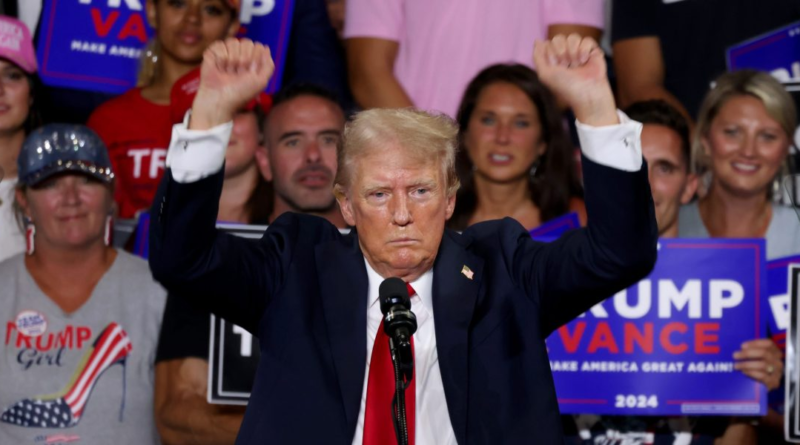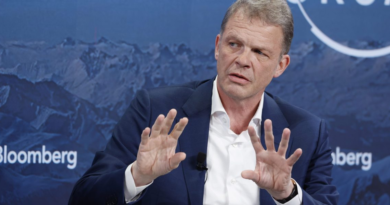The world’s riskiest debt may actually offer protection against U.S. election turmoil
Debt from some of the world’s riskiest nations is tipped to offer emerging-market investors protection against US election upheaval.
Money managers at William Blair Investment Management and Amundi SA are diversifying their portfolios with frontier-market government bonds — the high-yield debt of less advanced economies in the developing world such as Nigeria and Kazakhstan — saying these nations face limited exposure to geopolitical shifts and changes in US policies.
This stands in contrast with the risk faced by investment-grade countries like Mexico, which could encounter significant headwinds from new trade barriers under a potential Donald Trump presidency. China, another high-grade issuer, might see Trump intensify the trade restrictions imposed under the Joe Biden administration, in addition to a more hostile foreign policy environment.
In a year that’s been marked by rising geopolitical tension and electoral upheaval, the dollar bonds of frontier nations have so far returned nearly 6%, more than five times the gains of their higher-grade emerging-market peers. Investors say this trend could continue if a win for Trump sets off volatility across markets.
“We believe that now is a very appealing point in time to be looking at frontier markets,” said Yvette Babb, a portfolio manager at William Blair. “Frontier markets are driven by more idiosyncratic developments and they most certainly have a lower correlation to global sentiment.”
A win for riskier debt during a potential second Trump tenure will be a repeat of what happened in his first term.
During the four years through January 2021, frontier debt had returned 30%, compared to the 21% delivered by investment-grade emerging-markets issuers. For the Biden years, frontier debt has also outperformed, delivering 3% compared to the 10% in negative returns from their less-risky peers.
In his latest campaign, Trump has made new and increased tariffs part of his platform, floating levies of as high as 60% on Chinese goods. These policies, which could stoke inflation and keep interest rates elevated for longer, pose fresh risks for emerging-market assets, according to Goldman Sachs Asset Management.
The higher yields of frontier debt would cushion investors against rate volatility, said Carmen Altenkirch, an analyst at Aviva Investors Global Services in London. As it stands, frontier and other junk-rated nations offer a premium of more than 500 basis points over US Treasuries, compared to about 100 basis points for high-grade EM bonds, according to data compiled by Bloomberg.
“Long duration EM bonds, particularly in the investment-grade space, have little spread cushion,” Altenkirch said. “They will be very exposed to moves in long-end US Treasuries where fiscal concerns will dominate.”
Even before the potential fallout of a Trump-led White House came into view, the local-currency bonds of frontier markets have won recommendations from fund managers including JPMorgan Chase & Co. and Pacific Investment Management Co. For them, widespread structural reforms that involved devaluations and interest-rate hikes were set to boost returns.
The reforms have also augmented fiscal strength and lowered the risk of default. The number of countries with bonds trading at distressed levels had subsequently halved in the space of a year, according to data compiled by Bloomberg.
Despite the optimism, frontier debt could still inflict the biggest pain on investors when things go wrong. Last year, Bolivian bonds lost about a third of their value, followed by Ecuador and Belarus, accounting for the worst losses within the developing world.
A second Trump tenure would be “a mixed bag” for frontier nations, said Amundi’s Yerlan Syzdykov, the asset manager’s head of emerging markets. He said he was “interested” in countries like Vietnam while also considering nations from central Asia such as Kazakhstan, a major producer of uranium.
In theory, all of these countries “will be benefiting from that old fractioning global economy and rerouting of the trade and capital flows,” Syzdykov said. “Part of it is true, part of it may not necessarily be true, because even countries like Vietnam potentially could fall victim of trade wars if Trump becomes president.”
With emerging-market issuance set to slow for the remainder of the year, the prospect of a Trump presidency is an added layer of uncertainty that could keep borrowing costs high.
Additionally, the risk of tighter US monetary policy could boost the dollar and weigh on the currencies and borrowing costs of all emerging-market issuers, including frontier nations.
Still, the conclusion of debt restructuring in countries such as Zambia and Sri Lanka, coupled with economic reforms in places like Egypt, have eased worries over risk.
LGT Capital Partners has taken up positions in Egyptian and Nigerian bonds after staying on the sidelines for years, said Jetro Siekkinen, the head of emerging-market income at the $100 billion asset manager. Their insulation from global volatility would support the debt for the next 12 months to two years, he said.
“What happens in Uruguay does not have any meaning for Uganda and what goes on in Uganda doesn’t impact Uzbekistan,” Siekkinen said. “It helps me sleep overnight.”




